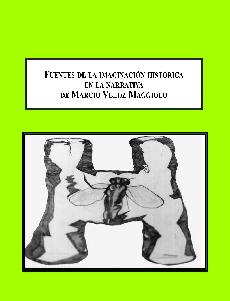This is our backup site. Click here to visit our main site at MellenPress.com
Fuentes De La ImaginaciÓn HistÓrica En La Narrativa De Marcio Veloz Maggiolo

| Author: | Rodríguez-Henríguez, Rafael | |
| Year: | 2010 | |
| Pages: | 208 | |
| ISBN: | 0-7734-1330-8 978-0-7734-1330-6 | |
| Price: | $179.95 | |
This study examines four novels by Marcio Veloz Maggiolo. It reveals the fundamental sources used in these novels in constructing the concept of the “historical imagination”. The analysis shows that the traditional concept of “official history” is rejected to give rise to an eclectic view of the past that embraces scientific and philosophical knowledge, the voices of the marginalized “other”, folkloric manifestations, and the imaginative reflections of the characters and narrators. This book contains one color photograph.
Reviews
“The contribution of this study to Latin American literature is significant, more so in the neglected area of Dominican (and Caribbean) literatures. The author has not limited himself to provide a traditional analysis of four of Veloz Maggiolo’s novels but a suggestive interdisciplinary approach which will prove to be a required reading for those studying Dominican and Caribbean literatures and a valuable reference for literary studies in general.” – Prof. Angel L. Estévez, The City College, City University of New York
“Rodríguez comparisons to Carpentier, Arguedas, Kafka and Borges enrich and contextualize this book in a more ample frame of reference. These diverse approaches reveal the complexity of this half island, a junction of ethnic groups y cultures. This study, carried out with great thoroughness and attention to words, makes an important and valuable contribution to the field. It will become a mandatory reference within the increasing corpus of critical studies about Dominican literature.” – Prof. Rita de Maeseneer, Universiteit Antwerpen
“Las comparaciones con Carpentier, Arguedas, Kafka o Borges enriquecen y contextualizan este libro en un marco más amplio. Estos acercamientos diversos nos revelan la complejidad de esta media isla, cruce de etnias y culturas. Este estudio, llevado a cabo con gran minuciosidad y con atención a las palabras, significa una aportación importante y valiosa. Se convertirá en una referencia obligatoria dentro del corpus cada vez más amplio de estudios críticos sobre la literatura dominicana.” – Rita de Maeseneer, Universiteit Antwerpen
“Rodríguez comparisons to Carpentier, Arguedas, Kafka and Borges enrich and contextualize this book in a more ample frame of reference. These diverse approaches reveal the complexity of this half island, a junction of ethnic groups y cultures. This study, carried out with great thoroughness and attention to words, makes an important and valuable contribution to the field. It will become a mandatory reference within the increasing corpus of critical studies about Dominican literature.” – Prof. Rita de Maeseneer, Universiteit Antwerpen
“Las comparaciones con Carpentier, Arguedas, Kafka o Borges enriquecen y contextualizan este libro en un marco más amplio. Estos acercamientos diversos nos revelan la complejidad de esta media isla, cruce de etnias y culturas. Este estudio, llevado a cabo con gran minuciosidad y con atención a las palabras, significa una aportación importante y valiosa. Se convertirá en una referencia obligatoria dentro del corpus cada vez más amplio de estudios críticos sobre la literatura dominicana.” – Rita de Maeseneer, Universiteit Antwerpen
